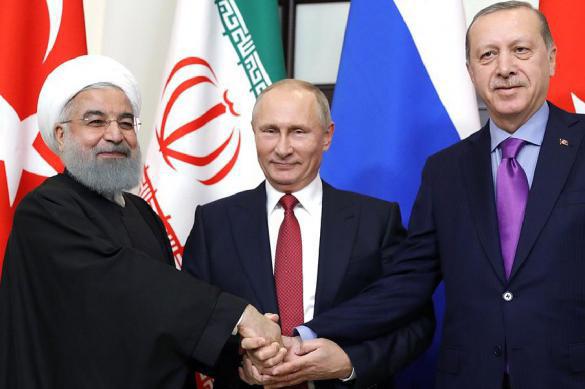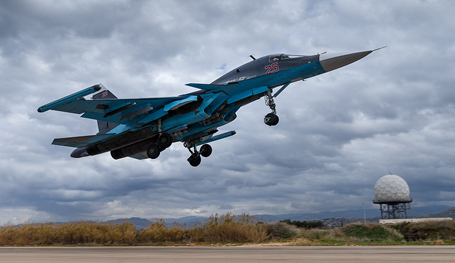Russia, Iran and Turkey decide Syria's future in Tehran - War in Syria
The third summit of the leaders of Russia, Iran and Turkey was the crisis in Syria's Idlib Province. The participants of the summit agreed that one needs to disarm terrorists and exclude a possibility for a humanitarian disaster in the country.

"We hope that representatives of terrorist organisations will have enough common sense to stop resistance and lay down their arms," Russian President Vladimir Putin said on September 7 in Tehran at the summit of the "troika" of guarantors of an armistice between government troops and moderate armed opposition in Syria.
The de-escalation zone in Idlib, as well as parts of territories of neighbouring provinces of Ham and Latakia, is one of four de-escalation zones that the "troika" established in Syria in 2017. Idlib is the last deescalation zone that still remains under the control of terrorists and militants of moderate opposition.
This is the third time, when the leaders of Russia, Iran and Turkey gather for the tripartite summit to discuss the crisis in Syria. Following the latest meeting in Tehran, a declaration was approved, in which the parties reaffirmed their commitment to preserve Syria's sovereignty and integrity and dissociate the country's moderate opposition from terrorist groups. The presidents also spoke of the need to continue a political settlement in Syria, including an opportunity to establish a constitutional committee. They also stressed the need to create conditions for the safe and voluntary return of refugees to Syria. The countries agreed to consider the possibility of holding an international conference on Syrian refugees and internally displaced individuals, the declaration reads.
Turkish President Recep Erdogan noted that Ankara does not want Idlib to become a "lake of blood", so one should not give the province to the "mercy" of Syrian President Bashar Assad. The Syrian army that controls all other deescalation zones in Syria, has been building up troops on the front line at the borders of the Idlib Province preparing for a military operation to eliminate terrorists.
On the eve of the summit of the Troika in Tehran, Syrian Prime Minister Imad Khamis stated that Idlib would soon come under the control of the Syrian government.
Turkey does not want Damascus to go on an offensive in Idlib. Ankara supports moderate formations of armed opposition in this province. Yet, Damascus insists that a military operation is needed to destroy terrorists in the region. In turn, Russia wants Turkey to distinguish between moderate insurgents and extremists in order to resolve the problem of Idlib.
In order to avoid bloodshed, Ankara developed a plan to disarm and withdraw militants from the Syrian province. In accordance with the plan, militants of 12 groups should hand over their weapons to the Turkish-backed coalition of insurgents from the moderate opposition. In return, they will be able to safely exit the province to a "buffer zone", whereas foreign militants will be allowed to return home. It remains unknown, however, where the Turkish military plan to withdraw the militants to.
The United States remains opposed to the large-scale military operation in Idlib. US President Trump warted Bashar Assad not to attack the province. Trump also warned Russia and Iran against their participation in the operation that may trigger potential humanitarian tragedy.
The situation around Idlib is fuelled by reports of the impending use of chemical weapons in this province of Syria with Syrian opposition and Western countries, primarily the United States, saying that it is the Syrian army that is going to apply chemical weapons there. Russian officials claim that the chemical attack in Syria will be staged to give Washington an opportunity to strike another, stronger, missile blow on Syria.
The crisis in Idlib prompted Russia to launch large-scale exercises of the Russian Navy with the participation of Aerospace Forces in the Mediterranean Sea. The drills will last until September 8. Twenty-six warships and vessels of the Northern, Baltic, Black Sea fleets, as well as of the Caspian Flotilla, including two submarines, and 34 aircraft take part in the exerciseв that will end on September 8.
Subscribe to Pravda.Ru Telegram channel, Facebook, RSS!





